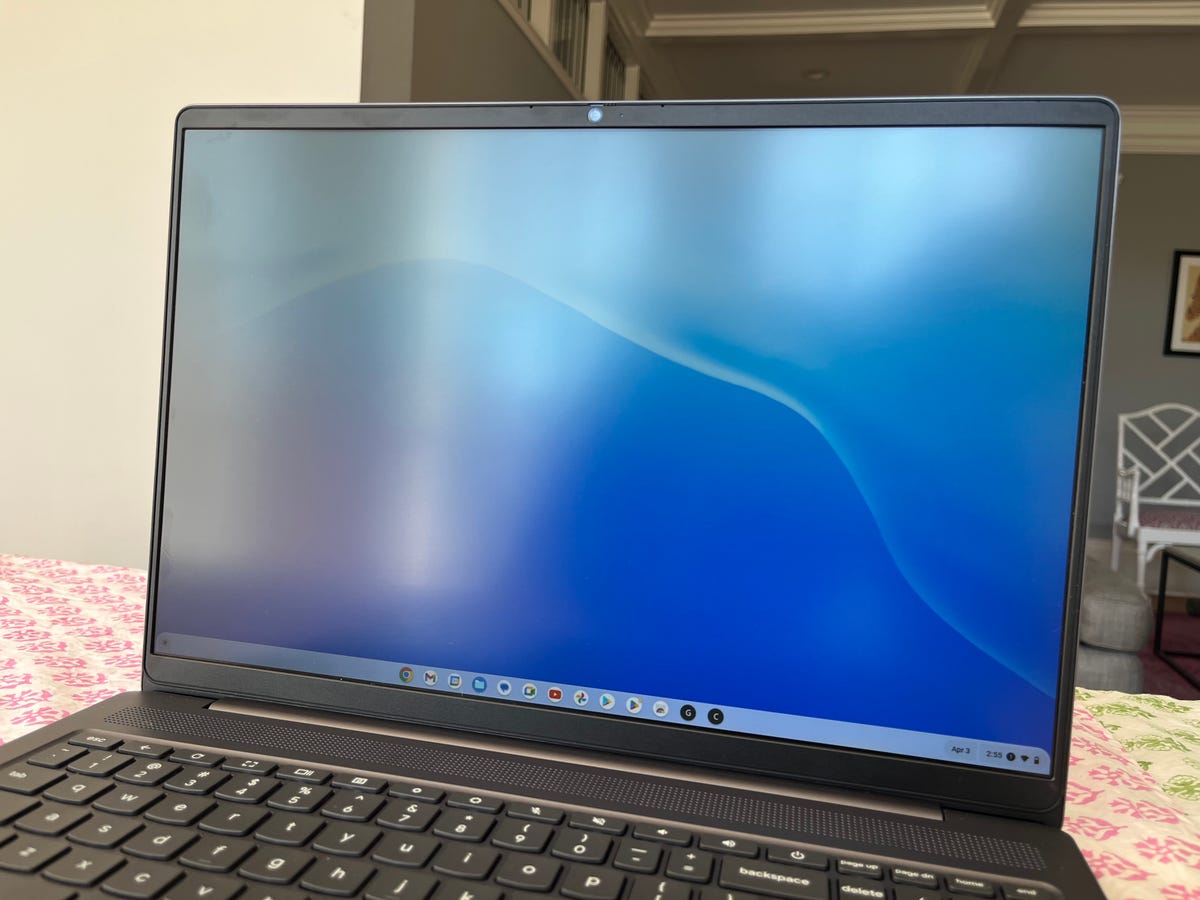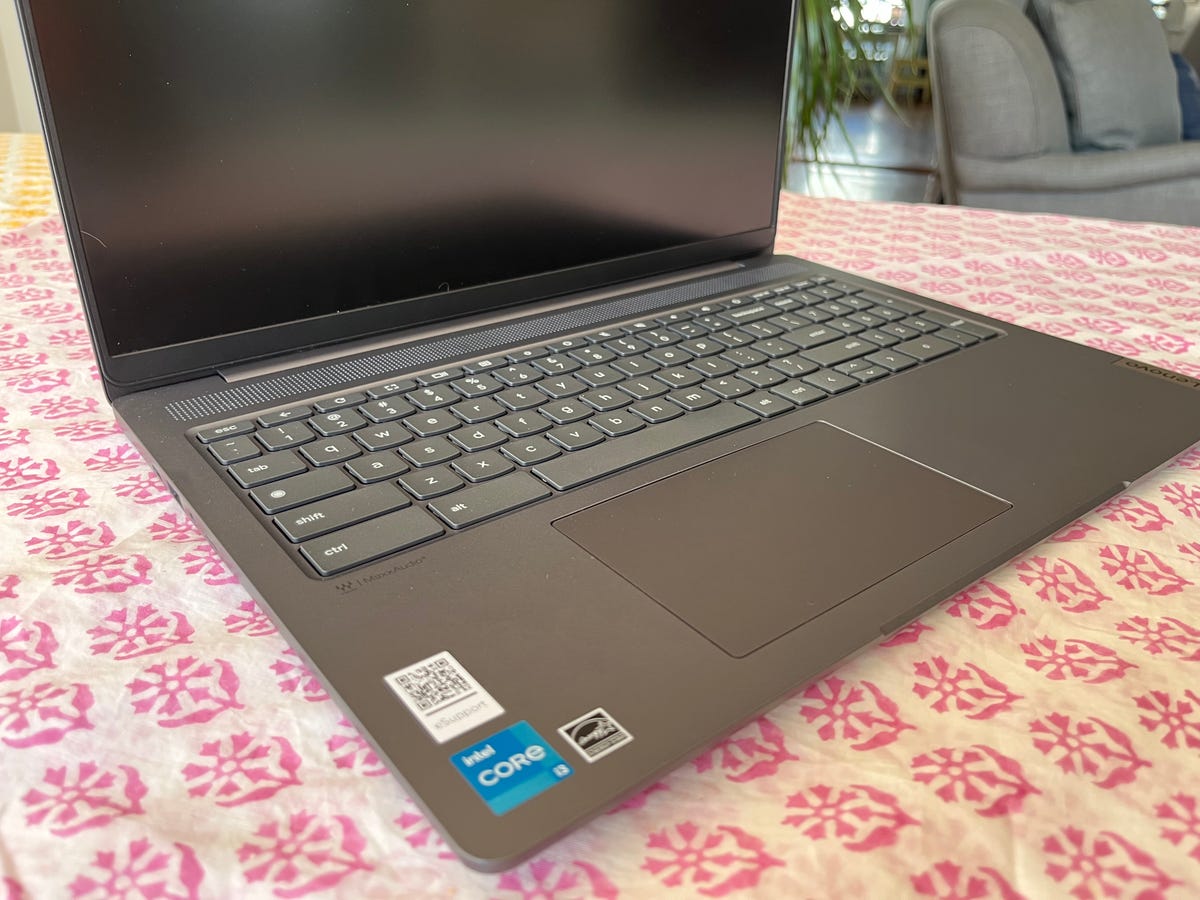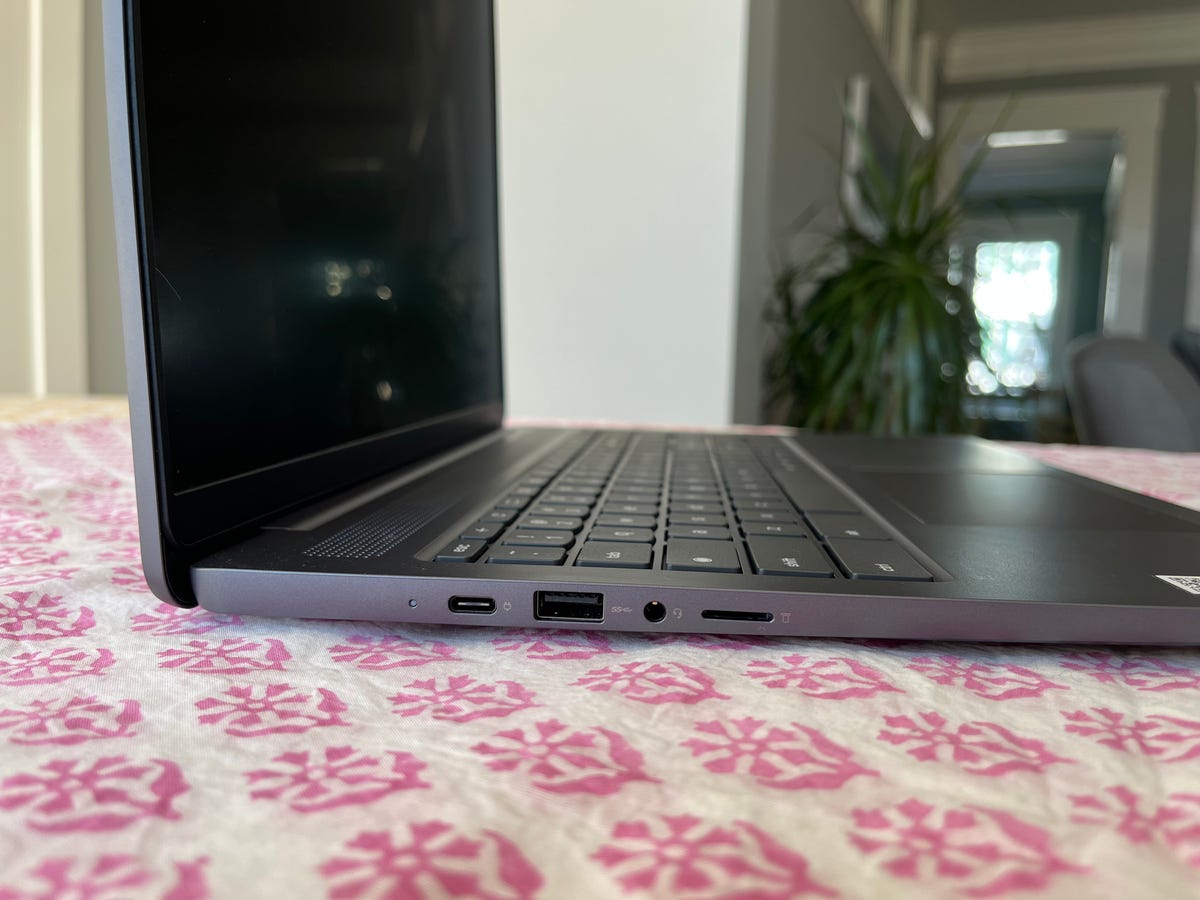
Big-screen Chromebooks began to emerge last year. The 16-inch Acer Chromebook 516 GE was released last fall as one of the first gaming-focused Chromebooks. And before that, the 17.3-inch Acer Chromebook 317 from last spring still holds the crown as the world’s biggest Chromebook. It is certainly large, but the model we tested was based on a low-end Pentium processor and, thus, underpowered — especially when held up against a gaming Chromebook. The Lenovo IdeaPad 5i Chromebook slots in between these two extremes. It boasts a modern, 16-inch, 16:10 display powered by a modern, 12th-generation Core i3 chip but lacks the extra hardware found on a gaming Chromebook.
What prevents the IdeaPad 5i Chromebook from being included among this new breed of gaming Chromebook? For one, its display has the standard 60Hz refresh rate rather than a speedy 120Hz for smoother motion in games. For another, it lacks an anti-ghosting keyboard that can register every keystroke, even during the most furious action in a game. What you are left with, however, is a highly capable, roomy Chromebook for home use, whether you are working from home or just need an extra laptop for browsing the web and watching shows and movies. Just don’t stray too far from a wall outlet.
Like
- Roomy 16-inch 16:10 display
- Strong, Core i3 performance
- Solid build quality
- 1080p webcam
Don’t Like
- Short battery life
- No keyboard backlighting
Our IdeaPad 5i Chromebook test model costs $550 from Lenovo but is currently discounted to $420. It costs £550 in the UK and isn’t available in Australia, but the UK price converts to AU$1,020. That pricing puts it in the midrange of the Chromebook scale, and it offers excellent value with a 12th-gen Core i3 CPU, 8GB of RAM and 128GB of local storage. The roomy, 16-inch display features a crisp, 1,920×1,200-pixel resolution with 16:10 aspect ratio and is rated for a sufficient 300 nits of brightness. And above the display resides a sharp 1080p webcam with a physical privacy shutter.
The Core i3-1215U might be a bit underpowered in a workhorse Windows laptop and have you pining for a more powerful Core i7 or even a midrange Core i5 chip. But in this Chromebook, the i3 has plenty of muscle to run Google’s lightweight ChromeOS without a hitch. Apps open quickly, and I was able to multitask with more than a dozen tabs running in Chrome without experiencing any lag.
Its 3D graphics performance is lackluster as indicated by its poor 3DMark result, but it performed well on Google’s Octane 2 benchmark, which measures its ability to run a variety of web applications. It managed to last only 5 hours and 21 minutes on our online streaming battery drain test, however, which is a great deal shorter than competing Chromebooks and a bit shocking given that the system is based on an efficient U-series Intel Core processor.

Matt Elliott/CNET
Capacious Chromebook
Despite its large, 16-inch, 16:10 display, the IdeaPad 5i Chromebook remains quite portable, weighing a reasonable 4.2 pounds. That’s nearly a pound lighter than the 5-pound, 17.3-inch Acer Chromebook 317 but slightly heavier than the 3.8-pound, 16-inch Acer Chromebook 516 GE. It might be a bit too big to carry to class each day, and the below-average battery life also keeps it from being a top pick for campus life.
Like most mainstream Chromebooks, the IdeaPad 5i features a plastic enclosure. But this one looks and feels better than the typical plastic Chromebook. The dark gray color gives it an understated, classy look. Even better is the firm feel of the plastic chassis; there is very little flex in the keyboard deck and lid protecting the display.
The display features a fine, 1,920×1,080-pixel resolution with a 16:10 aspect ratio that’s taller than a traditional 16:9 widescreen display. The added vertical space means you need to scroll less through long documents and web pages. The display really feels roomy and provides ample space for multitaskers to juggle open windows. The display is rated for a sufficient 300 nits of brightness, and my own measurements confirmed that rating. The display looked washed out under direct sunlight but provided enough brightness in every indoor scenario, including a sun-drenched breakfast nook.

Matt Elliott/CNET
The display features a standard 60Hz refresh rate, but that doesn’t mean you can’t play games on it. Browser-based games ran smoothly in Chrome and looked great on the big display. The speakers produce underwhelming, muddied audio, so keep your headphones or Bluetooth speaker nearby for playing games and watching shows and movies.
Along with the modern display and modern CPU comes a modern webcam in the form of a 1080p camera. It produces a clean, well-balanced image that’s night and day compared to the image you’re likely accustomed to from a 720p webcam. The webcam also has a physical privacy shutter, which lends peace of mind when the camera isn’t in use.
Asus squeezes in a number pad that Excel jockeys and other data-entry types might enjoy, but its inclusion doesn’t ruin the rest of the keyboard. The keys feel well-spaced and offer a soft and quiet but responsive feel. The keyboard lacks backlighting, making typing more difficult than need be in a dark room. We see some budget models with a lack of keyboard backlighting but expect to see this useful feature on a mainstream model.

Matt Elliott/CNET
The IdeaPad 5i Chromebook lacks an HDMI port, but it does supply a pair of USB-C ports for your external monitor, data and power connection needs. There are also two USB-A ports for connecting a mouse or older USB devices, and you also get a microSD card slot for easy local storage expansion if you fill up the 128GB eMMC flash storage.
With its roomy display, a powerful-for-a-Chromebook Core i3 processor and an attractive, well-built chassis, the Lenovo IdeaPad 5i Chromebook is a great pick as a WFH Chromebook or an extra family entertainment device for your home. It’s inexpensive and provides snappy performance and ample screen space for multitaskers to get you through the busiest parts of the day and watching shows and movies at night. And the full-HD webcam will allow you to appear crisp and clear to your video conference mates, too. For students trekking to class each day, however, a smaller and more portable Chromebook with longer battery life such as the Acer Chromebook Spin 513 or Lenovo Flex 5i Chromebook is a better choice.
3DMark Wild Life Unlimited
Asus Chromebook Vibe CX55 Flip
Lenovo IdeaPad 5i Chromebook
Note:
Longer bars indicate better performance
Google Octane 2
Lenovo IdeaPad 5i Chromebook
Asus Chromebook Vibe CX55 Flip
Acer Chromebook 514 (CB514-2HT-K0FZ)
Note:
Longer bars indicate better performance
Online streaming battery drain test
Acer Chromebook 514 (CB514-2HT-K0FZ)
Asus Chromebook Vibe CX55 Flip
Lenovo IdeaPad 5i Chromebook
Note:
Longer bars indicate better performance
System Configurations
| Lenovo IdeaPad 5i Chromebook | Google Chrome OS 110.0.5481.181/Android 11; 1.2GHz Intel Core i3-1215U; 8GB RAM; 128GB SSD |
|---|---|
| Acer Chromebook 714 | Google Chrome OS 103.0.5060.132/Android 11; 2.5GHz Intel Core i5-1235U; 8GB RAM; 256GB SSD |
| Acer Chromebook 514 | Google Chrome OS 99.0.4844.57/Android 9; 2.6GHz MediaTek Kompanio 828 Octa-Core MT8192T ARM Cortex-A76/A55 Multi-Processor; 8GB RAM; 64GB SSD |
| Asus Chromebook Vibe CX55 Flip | Google Chrome OS 110.0.54470/Android 11;2.4GHz Intel Core i5-1135G7;8GB RAM; 256GB SSD |
| Acer Chromebook 516 GE | Google Chrome OS 110.0.54470/Android 11; 1.7GHz Intel Core i5-1240P; 8GB RAM; 256GB SSD |
